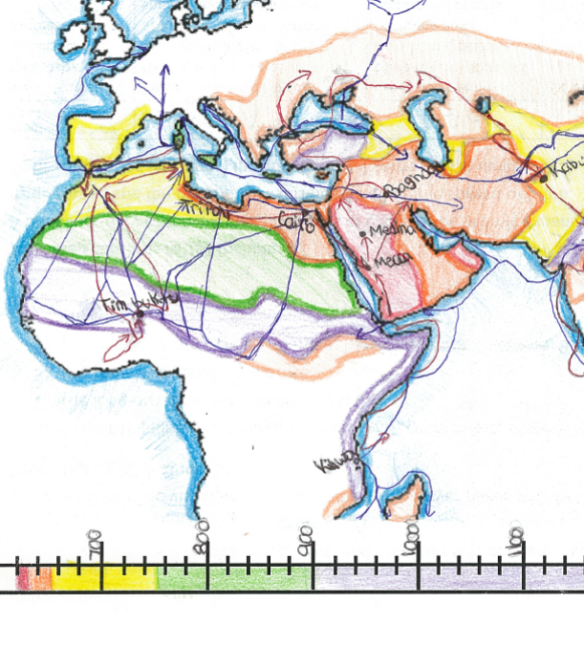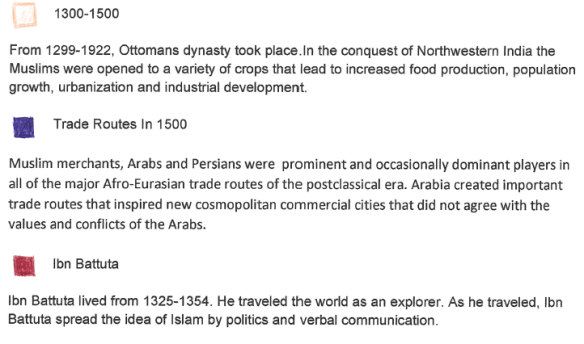
The societies of China and Europe in the fifteenth century both took part in the surge of exploration and travel that came about at that time. Although they both sent expeditions out into unknown or far off parts of the world, Europe and China were very different in their explorations. The differences are clearest in the motivations of each, the equipment and techniques used during the expeditions, and the support that they received through their respective governments.
The Chinese and European motivations for exploration were completely different. The divided city states of Europe were looking for wealth in Africa and Asia, and converts to Christianity.[1] The Chinese, however “sought to enroll distant peoples and states in the Chinese tribute system,” and to establish China’s power across the east.[2] Since the main motivations of European exploration was wealth and territory, this pushed them to continue to expand the scale of the explorations, far past the travels of one of China’s most prominent explorers, Zheng He. Once China established their dominance in the Indian Ocean, explorations were deemed unnecessary, and Zheng He and his crews were called back to China.[3] The Europeans, however, continued to explore, feeling that they could continue to accumulate wealth and build new empires as a result of continued explorations.
Another difference between the explorations of Europe and China in the fifteenth century were the equipment and navigational techniques used. Europeans depended on small boats called caravels, reaching up eighty five feet in length and designed for maneuverability.[4] They also used the astrolabe, which was used to help navigate based on the stars.[5] The Chinese, however, had invented the compass to navigate, a new and more advanced system.[6] Additionally, they had much bigger ships, Zheng He’s “‘treasure’ ships measuring more than 400 feet long.”[7] These technologies made traveling much easier for the Chinese and with their advanced navigation tools, crews such as Zheng He’s could easily make their way to their destinations. With more time, the Europeans may have fallen behind due to their lack of technology and the Chinese could have moved ahead on the front of exploration. But due to the early end of Chinese expeditions, Europe was not negatively impacted by the size of their ships or the quality of their navigation, because of the lack of Chinese competition.
The Chinese and Europeans also differed greatly when it came to the support that explorers received from their governments. Even considering the early success of the Chinese expeditions lead by Zheng He, “high-ranking officials had long seen the expeditions as a waste of resources.”[8] This opinion lead to the end of official Chinese explorations soon after Emperor Yongle died. In Europe, however, the age of exploration was received very differently. Many people in the multitude of separate governments and countries were interested in explorations. Merchants saw a chance to profit from trade, government officials saw a chance to tax newly settled lands, and the Church saw an opportunity to increase conversions.[9] The gap between the support Chinese and European explorers received greatly impacted the amount and scale of their expeditions, with the European governments providing funding and equipment for many journeys that continued their streak of widespread discoveries and travels. This surge occurred as the Chinese expeditions halted completely, showing how essential government support was to expeditions like these.
The European and Chinese explorations in the fifteenth century were very different. The two places had very different motivations for exploration, with Europe looking for territory and wealth, and the Chinese searching to establish the power of their country. Different technologies were used, the Chinese boats and navigation techniques being much more advanced. Also, the Chinese and the Europeans received different amounts of support from their home governments. These differences affected both the ability of explorers from these places to succeed, as well as the amount of expeditions that were sent out from Europe and China.
[1] Robert W. Strayer, Ways of the World: A Complete Global History With Sources (New York: Bedford/St. Martins, 2011), 581.
[2] Robert W. Strayer, Ways of the World: A Complete Global History With Sources (New York: Bedford/St. Martins, 2011), 578.
[3] Robert W. Strayer, Ways of the World: A Complete Global History With Sources (New York: Bedford/St. Martins, 2011), 578.
[4] Roger B. Beck et. al, World History: Patterns of Interaction (Orlando: Houghton Mifflin Harcourt Publishing Company, 2012), 531.
[5] Roger B. Beck et. al, World History: Patterns of Interaction (Orlando: Houghton Mifflin Harcourt Publishing Company, 2012), 530.
[6] Roger B. Beck et. al, World History: Patterns of Interaction (Orlando: Houghton Mifflin Harcourt Publishing Company, 2012), 530.
[7] Roger B. Beck et. al, World History: Patterns of Interaction (Orlando: Houghton Mifflin Harcourt Publishing Company, 2012), 537.
[8] Robert W. Strayer, Ways of the World: A Complete Global History With Sources (New York: Bedford/St. Martins, 2011), 578.
[9] Robert W. Strayer, Ways of the World: A Complete Global History With Sources (New York: Bedford/St. Martins, 2011), 583.



